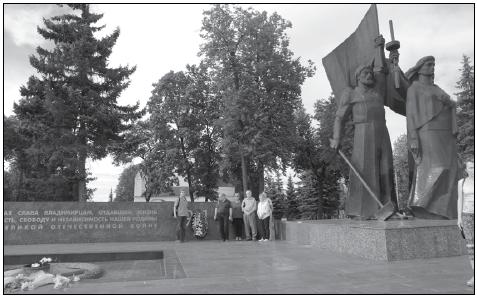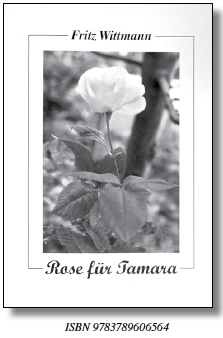“Rose for Tamara” – a “human contact with the enemy”
“Rose for Tamara” – a “human contact with the enemy”
by Moritz Nestor
On 2 January 2001, the first edition of the unique book “Rose for Tamara” by Fritz Wittmann was presented under the patronage of the former Lord Mayor of Erlangen, Dr Dietmar Hahlweg, initiator of town twinning between Erlangen and Vladimir. Fritz Wittmann wrote this book in collaboration with Peter Steger, representative for town twinning of the city of Erlangen. The moving subtitle of the author Fritz Wittmann from Baiersdorf is: “Even in the winter season through the thickest cotton jacket you feel the cordiality in a Russian embrace.” One, who has experienced this, writes in this way.
The book contains the memories of Fritz Wittmann and of other ten former German prisoners of war who, years after the war, lived in camps of the Russian city of Vladimir and in other camps of the USSR.

The city of Vladimir, situated east of Moscow behind the front, was converted into a camp and military hospital base in the summer of 1941 after the invasion of the “Wehrmacht”. When the German advance was stopped before Moscow in the winter, the first people of Erlangen were delivered to Vladimir as war prisoners.
In the preface to the second edition of the book of 2008, the 25th anniversary of the town twinning between Erlangen and Vladimir, Erlangen First Mayor Andreas Galster writes: “Yes, there were many terrible experiences. But had not the German soldiers brought the terror into a country that did not want war? And did they not have to expect revenge and hatred? It was all the more surprising, with how much compassion and sympathy the prisoners of war were treated on the part of the population and, in part, even of the guardians and the commanders, but above all on the part of the hospital staff. This is exactly what the authors tell about in the anthology, which is characterized by Fritz Wittmann’s humane spirit and by his undiminished desire for reconciliation. In Vladimir, by the way, one was so taken with this work of peace, that it was already published in Russian translation in 2002, supplemented by memories of Russian contemporary witnesses.”

The author has received the first prize of the German-Russian Forum for civic engagement. It was supposed to be a “human contact with the enemy,” writes Fritz Wittmann. A project that he managed to do.
Above all, the book captivates the historian through a historiography “far from all stereotypes and images of the enemy, but also without any embellishment and historical misrepresentation.” A rarity of objectivity and relevance, paired with humanity and friendship between nations, far away from contractual historiography.
One gets quiet at reading, very quiet. A book that belongs to every political and historical lesson. And one wishes these “Wehrmacht” veterans, the last contemporary witnesses of the Second World War, to be more respected. They know what war in Russia was like, they have been in Stalingrad, and they know the Russian people from their own experience – as soldiers and as prisoners. In fact, so well as none of the elites in government responsibility, who have lost respect for the war and who are in the process of driving us into war again. •